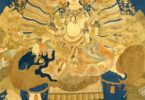《百喻经》
[The] Sūtra [Of A] Hundred Parables
(五八)二子分财喻
(58) Parable [Of The] Two Sons Dividing Wealth
昔摩罗国有一刹利,得病极重,必知定死,诫敕二子:「我死之后善分财物。」
[In the] past, [in] Malla Kingdom, [there] was [a] kṣatriya, [who] got [a] sickness [that was] extremely serious. Knowing [he will] definitely die, [he] ordered [his] two sons, ‘After my death, divide well [my] wealth [and] property.’
二子随教,于其死后分作二分,兄言弟分不平。
[The] two sons followed [his] instruction. After his death, [having] divided [them] as two parts, [the] elder brother said [his] younger brother’s part [is] not fair.
尔时有一愚老人言:「教汝分物使得平等。现所有物破作二分。云何破之?所谓衣裳中割作二分,槃瓶亦复中破作二分,所有瓫瓨亦破作二分,钱亦破作二分,如是一切所有财物尽皆破之而作二分。」
At that time, [there] was a foolish old man, saying, ‘[I will] instruct you [to] divide [the] property, [to] make [you] get [it] equally. Now [with] all [your] property, break [them] as two parts. How [to] break them? [With] so-called clothes [in the] middle cutting [them] as two parts, [with] plates [and] bottles likewise [in the] middle breaking as two parts, [with] all basins [and] jugs likewise breaking as two parts, [with] money likewise breaking as two parts, thus [with] all that wealth [and] property, completely all breaking them, then as two parts.’
如是分物人所嗤笑,如诸外道偏修 (ii) 分别论,论门有四种:(i) 有决定答论门,譬如人一切有皆死,此是决定答论门。
Thus, [the] person dividing property [was] that sneered [at], like all external paths partial [to] cultivating (ii) debate [with] differentiation, [when] debate categories have four kinds. (i) [There] is [the] debate category [of] definitive replying, for example, humans [and] all existing [will] all die, this is [the] debate category [of] definitive replying.
(ii) 死者必有生是应分别答,爱尽者无生,有爱必有生,是名分别答论门。
(ii) [Whether] those dead definitely [will] have birth [or not] is [to be] answered [with] differentiated replying. Those [with] attachment exhausted [are] without birth, [and those] having attachment definitely [will] have birth. [This] is named [as the] debate category [of] differentiated replying.
(iii) 有问人为最胜不?应反问言:「汝问三恶道?为问诸天?若问三恶道,人实为最胜;若问于诸天,人必为不如。 」如是等义,名反问答论门。
(iii) [There] is [the] question, are humans [the] most supreme [or] not? Answering [in] reverse [with a] question, saying, ‘You [are] asking [about the] three evil paths? [Or] are asking [about] all heavens? If asking [about the] three evil paths, humans truly are [the] most supreme. If asking about all heavens, humans [are] definitely as not as good.’ [With] thus [and] other meanings, [this is] named [the] debate category [of in] reverse [with a] question replying.
(iv) 若问十四难,若问世界及众生有边无边、有终始无终始如是等义,名置答论门。
(iv) If asked [the] fourteen debatable [questions], thus asking [about the] world and sentient beings having boundaries [or being] without boundaries, having ending [and] beginning, [or being] without ending [and] beginning, thus [and] other meanings, [this is] named [the] debate category [of] set aside replying.
[Note 1: The fourteen debatable (and pointless) questions are: (1) Is the world permanent? (2) Is the world impermanent? (3) Is the world both permanent and impermanent? (4) Is the world neither permanent nor impermanent? (5) Is the world with boundaries? (6) Is the world without boundaries? (7) Is the world both with boundaries and without boundaries? (8) Is the world neither with boundaries nor without boundaries? (9) Does the Thus Come One exists after Parinirvāṇa? (10) Does the Thus Come One not exist after Parinirvāṇa? (11) Does the Thus Come One both exists and not exist after Parinirvāṇa? (12) Does the Thus Come One neither exists nor not exist after Parinirvāṇa? (13) Are self (i.e. life-force) and the body the same? (14) Are self (i.e. life-force) and the body different? Their answers will be realised upon attainment of Buddhahood.]
诸外道愚痴自以为智慧,破于四种论作一 (ii) 分别论,喻如愚人分钱物破钱为两段。
All external paths [are with] ignorance personally assumed as wisdom, [with] breaking of [the] four kinds [of] debate [categories] as one (ii) debate [with] differentiation. [As an] analogy, [they are] like [the] foolish person dividing money [and] property, breaking money as two sections.
[Note 2: With different considerations, different problems might need to be solved with different approaches. If there is only one approach used for solving all problems, there might be more problems created instead.]
[Note 3: (i) Some problems can be solved directly. (ii) Some more complex problems need to be broken down into simpler problems to be solved separately. (iii) Some problems are by themselves problematic and need to be redefined first. (iv) Some problems are not actual practical problems and should be set aside.]
Namo Amituofo : Translation and notes by Shen Shi’an
上个喻
Previous Parable:
蹋长者口喻
[57] The Parable Of Stepping On The Elder’s Mouth
https://purelanders.com/2023/09/26/57-the-parable-of-stepping-on-the-elders-mouth-from-the-sutra-of-a-hundred-parables
下个喻
Next Parable:
观作瓶喻
[59] The Parable Of Looking At Making Bottles
https://purelanders.com/2023/09/28/59-the-parable-of-looking-at-making-bottles-from-the-sutra-of-a-hundred-parables
全百喻
All Hundred Parables:
https://purelanders.com/baiyu





